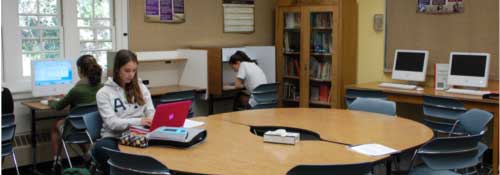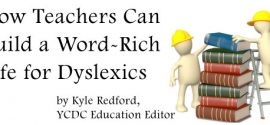Rand Center: A Commitment to Accommodations

“Dyslexia robs a person of time; accommodations return it.” Dr. Sally Shaywitz
As the Education Editor at the Yale Center for Dyslexia and Creativity, I have the privilege of learning about many innovative and effective ways that educators, all over the country, are supporting students with dyslexia. Many would argue the most important accommodation is the provision of extra time.
The challenge most educators face is figuring out how to make that extra time available in the most equitable and efficient way possible. Usually, when teachers resist giving students access to extra time on tests it reflects some, or all, of the following concerns: When and how to proctor these extended time tests? How do teachers determine who deserves extra time? Does the allocation of extra time to certain students give them an unfair advantage over their classmates?
We are aware that teachers rarely have time built into their daily schedules for chasing down students to finish tests. When that is the expectation, extra time is usually allocated sparingly and inconsistently. We also understand that determining who deserves extra time can be complicated.
The Branson School, a 9-12 independent high school in Marin County, has devised a effective response to many of these challenges: they have created an onsite testing center that responds to teacher’s concerns about how extra time is administered, and also makes the accommodations available to anyone who needs it (including students who have other learning issues). Because the question of how to provide extra time is such a vexing issue for most schools, I asked Karen Whitaker, the academic dean at Branson, if she would explain how the testing center at Branson works. –Kyle Redford
A Commitment to Accommodations
by Karen Whitaker
The Alan Rand Center at The Branson School, established in 1994, provides support to the approximately eight percent of our students with documented learning differences, as well as another ten percent who consistently use the Center for support with study skills and discretionary extended time on assessments. Branson is proud of our commitment and ability to provide extended time to all students who learn better with a time accommodation—students with and without documented learning differences.

A straightforward system and collaboration among students, teachers, and the Center staff are at the heart of our success with extended time accommodations. By filling out a simple form, students request extended time from the teacher prior to an assessment and schedule their extended time with the Rand Center staff. The classroom teacher may deliver the assessment to the Rand Center in advance or simply hand the student the assessment and send him/her off to the Rand Center at the designated time. Because most of our students qualify for fifty percent extended time, they need to find an additional twenty-five to thirty minutes in conjunction with class time for uninterrupted testing. Our schedule makes this fairly easy: students can test into lunch, tutorial period, a study block, or after school. Once in the Rand Center and ready to work, the students find a well-enforced quiet zone with few distractions. They may sit at open tables or in carrels: whatever suits their learning style.
Our students tell us we are on the right track in offering extended time. Through their feedback, we know extended time helps them maximize their academic success. Senior Sam Mickel looks back on his four years of academic accomplishments: “Especially as an incoming freshman, extended time really helped me learn to deal with my lisdexia. (Being able to joke about it helped as well.) At that point, I was well aware of where I made the most mistakes. Extended time allowed me to use my knowledge to its fullest potential and made it possible for me to identify and correct the mistakes I make because of my learning disability.” Junior Lucy Horn says, “Extra time helps relieve some the of the pressure in taking a test. I can focus without worrying about the clock or wondering when I need to finish. I can slow down on tests and make sure I understand everything I am reading or completing.”

Because the Rand Center staff oversees extended time testing, Branson teachers do not proctor extended time. This service to the faculty nurtures support for the Center and encourages teachers to offer discretionary extended time to students who don’t have documented learning differences but who might benefit from additional time for a variety of reasons. If a teacher reports a significant improvement in a student’s performance after experimenting with discretionary extended time, the Rand Center coordinator may contact the parents and offer information about the benefits of a full evaluation. On average, two students per year in our population of three hundred and twenty end up being fully assessed after a classroom teacher notices a pattern of difficulty and need for extra time. Teachers express appreciation for the Center’s consistency in proctoring extended time testing. The general attitude of the faculty is expressed well in this teacher’s comments: “It is nice that I don’t need to think about covering students who need extra time.” When asked which of the Rand Center services they appreciate most, many teachers listed “proctoring tests.”
The cost of operating The Rand Center includes the salary of a learning specialist and an assistant who works twenty-two hours per week. Branson will spend ninety-one thousand dollars to run the Center this school year. The assistant is key to the success of our extended time program. While the learning specialist visits classes, meets with teachers or parents, and coordinates learning support plans, the assistant fills in. The Center is open during lunch, a time when many students complete their extended time assessments. Additionally, teachers help out by covering the Center during a prep block in order to give the assistant a break. We’re also experimenting with assigning teachers to the Rand Center as their extra duty. Instead of advising a club or coaching a sport, the teacher staffs the Center for four hours per week, essentially providing students with curricular expertise while also helping with study skills and organization.
At year sixteen, the Center is still a work in progress, but we’re pleased with our system of offering extended time. Teachers don’t feel taxed trying to figure out how to provide special accommodations within their already full schedules and students can demonstrate their best work.
Related

Case Study – How Morningside Elementary School Helps Dyslexic Students Succeed
Teacher training and a well-stocked toolbox help dyslexic students succeed at one Atlanta public school.
Read MoreDyslexia and Civil Rights: Making Room on the Bus for All Children
My early experiences have become my bridge to understanding dyslexia and the plight of students whose strengths go unnoticed in the classroom.
Read More
Building a word-rich life for Dyslexics
A confession: I get a significant thrill from reading research that confirms my personal suspicions.
Read More
How speech-to-text transformed a student’s 5th grade year
Last fall, the fifth graders in my class were the lucky recipients of iPads–one for each student.
Read More